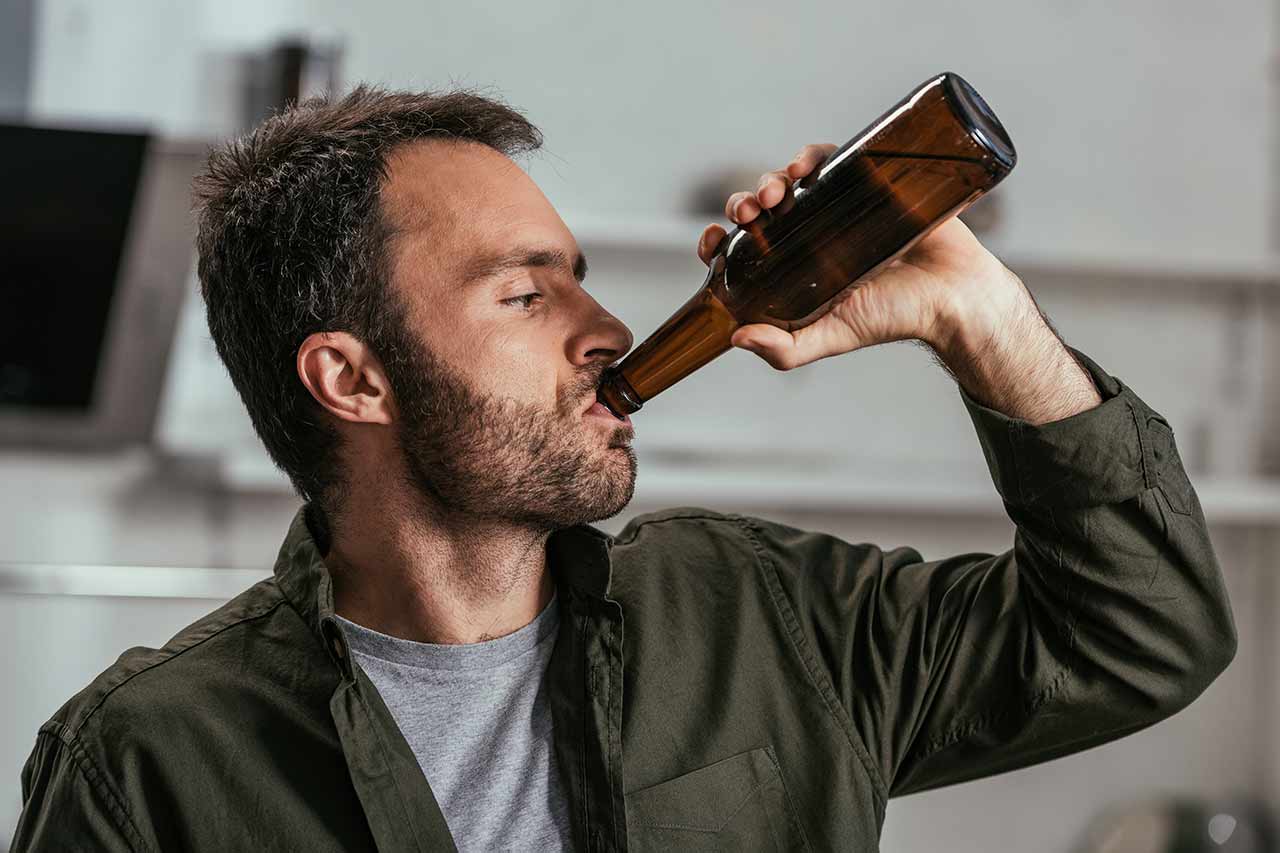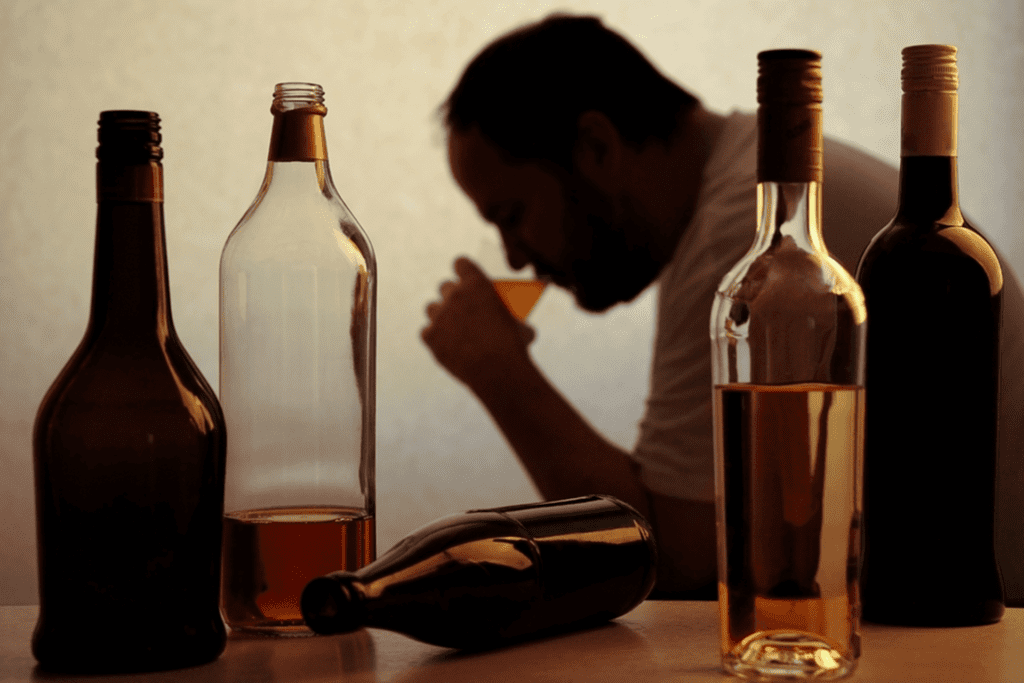Table of Contents
- What's Behind the Term "Alcoholic"?
- What Exactly is Alcohol Use Disorder?
- When Does Alcohol Use Become Unhealthy?
- Can Someone Really Lose Control Over Drinking?
- Is There a Connection Between Alcohol Use and Feeling Down?
- What are the Stages of Alcohol Use Disorder?
- How Does Excessive Drinking Affect a Person or Those Around Them?
- Where Can Someone Turn for Support?
What's Behind the Term "Alcoholic"?
It's interesting to think about how we talk about certain things, isn't it? Sometimes, a simple word carries a lot more weight than we might initially realize. Take, for example, the term "alcoholic." You know, that word people use. Well, that particular expression, "alcoholic," actually points to a person dealing with a health situation that doctors call "alcohol use disorder," or AUD for short. It's a real medical condition, and it's something that affects many, many people, so it's almost a common thing to hear about these days, really.
This condition, AUD, is more than just a casual choice; it means someone experiences a really strong, intense desire for alcohol. It's not just a passing wish, you see, but a deep, compelling urge that can feel very, very powerful. This strong pull can make it quite hard for someone to manage their drinking, even when they know it might be causing trouble in their life. It's a bit like an internal struggle, honestly, where the desire feels incredibly overwhelming.
You might have heard the word "alcoholism" before, and that's actually what alcohol use disorder includes, in a way. It describes a level of drinking that has, for a long time, been called "alcoholism." So, when people talk about someone being an "alcoholic," they are, in essence, referring to this medical situation where drinking has become a real issue, affecting a person's well-being and daily existence. It's a common medical condition, really, and it touches many lives.
What Exactly is Alcohol Use Disorder?
When we talk about alcohol use disorder, or AUD, we're essentially looking at a medical condition where someone has a persistent desire or a genuine physical need to consume alcohol. It's not just a casual habit, you know, but something that feels deeply ingrained. This condition means that, for someone experiencing it, stopping their drinking becomes incredibly difficult, even when they can clearly see that their alcohol use is causing problems for their health, their work, or their relationships. It's almost as if they are caught in a cycle they can't easily break free from, which is pretty tough to deal with, obviously.
The core of this disorder is really about an impaired ability to stop or even control how much alcohol is being consumed. Imagine wanting to stop, or wanting to cut back, but finding yourself unable to do so, despite knowing the negative things that might happen. That's a big part of what AUD looks like. It’s a situation where the consequences, whether they're social, job-related, or health-related, don't seem to be enough to make the person cease their drinking. It's a very challenging situation, to be honest, for anyone going through it.
This condition, sometimes still called "alcoholism" by many, is actually a common medical issue that affects lots of people. It means that the person has a deep, almost undeniable need to drink. This need isn't just mental; it can be a physical sensation, too. So, it's not just about willpower, but about a complex interplay of factors that make it very hard for someone to simply quit. It's a bit like dealing with any other chronic health condition, in some respects, requiring support and understanding.
When Does Alcohol Use Become Unhealthy - Beyond the Alcoholic Meme?
It's fair to wonder when having a drink crosses the line into something that's not so good for you, isn't it? Well, unhealthy alcohol use really covers any kind of drinking that puts your health or your safety at risk. This isn't just about what people might casually joke about in an "alcoholic meme" or online; it's about real-world effects. For example, if drinking causes you to get into risky situations, like driving when you shouldn't, or if it starts to make you feel unwell physically, then it's moving into that unhealthy territory. It's a pretty straightforward idea, actually, when you think about it.
This kind of problematic drinking can show up as a pattern where someone's alcohol use starts leading to dangerous circumstances. It might mean they're not able to meet their social obligations, like showing up for work or family events, because of their drinking. This isn't just about a single bad night, but a repeated way of behaving. It's a clear sign that things are getting out of hand, and it's something that often requires attention. You know, it's about the consistent impact on a person's life, and that can be very, very serious.
Furthermore, when someone is dealing with alcohol dependence, that means they have a physical and mental inability to quit drinking. This isn't just a matter of choice anymore; their body and mind have become accustomed to alcohol, making it incredibly hard to stop without experiencing withdrawal symptoms or intense cravings. This level of dependence is a significant indicator of unhealthy alcohol use, and it's a condition that truly needs professional care and support. It’s a very real challenge, as a matter of fact, that impacts a person's entire being.
Can Someone Really Lose Control Over Drinking - What an Alcoholic Meme Might Miss?
You might ask, "Can someone really lose control over their drinking?" And the answer, based on what we understand about alcohol use disorder, is a definite yes. It's a core part of the condition. A person might be considered to have alcohol use disorder when their drinking starts to negatively affect their personal life, their job, or causes serious consequences that they can't seem to avoid. This isn't just about making a bad decision once in a while; it's about a consistent pattern where alcohol takes over, so to speak.
This loss of control means that even when a person knows their drinking is causing problems – maybe their relationships are suffering, or they're having trouble at work, or their health is declining – they find themselves unable to stop. It's a pretty powerful grip that alcohol can have. This inability to stop, despite the clear adverse effects, is a key characteristic. It's not something that's easily fixed by just deciding to stop; it often requires a lot of support and different kinds of help, you know.
When someone can't control their drinking and starts suffering professional, social, or health consequences because of it, they might very well be diagnosed with alcohol use disorder. This isn't a moral failing; it's a medical condition. The popular image often seen in an "alcoholic meme" might simplify this, but the reality is far more complex and challenging. It's about a diminished ability to manage alcohol consumption, even when the person truly wants to, which can be incredibly frustrating and isolating for them.
Is There a Connection Between Alcohol Use and Feeling Down?
It's a pretty common observation that alcohol use and feelings of sadness or depression often go hand in hand. They are, in fact, frequently associated. Sometimes, a person might already be feeling quite low or depressed, and they might turn to alcohol as a way to cope with those difficult emotions. It's a kind of self-medication, in a way, even if it's not a healthy long-term solution. They might feel like it offers a temporary escape or numbing effect from their inner turmoil, which can be very appealing when you're struggling, naturally.
However, this can quickly become a tricky cycle. While alcohol might seem to offer some relief at first, it's actually a depressant itself. So, over time, drinking can actually make feelings of sadness or depression worse, rather than better. This creates a kind of feedback loop where the person drinks more to feel better, but then feels worse because of the drinking, leading to more drinking, and so on. It's a pretty tough situation to break free from, honestly, and it can really complicate things for someone trying to feel better.
Understanding this link is really important because it shows that addressing alcohol use often means also looking at underlying emotional well-being. If someone is using alcohol to deal with depression, then treating both aspects is usually the most effective path. It's not just about the drinking itself, but about the reasons behind it, which can be quite complex. So, if someone is struggling with both, it's a good idea to seek help that considers both elements, which is often the case, you know.
What are the Stages of Alcohol Use Disorder?
While the original text mentions "The five main stages of alcoholism include, This stage of alcoholism is," it doesn't detail what those stages actually are. However, we can still talk about how alcohol use disorder typically progresses, based on the descriptions we have. Generally, it starts with a pattern of drinking that might not seem problematic at first, but gradually, the desire for alcohol becomes stronger and more frequent. It's a bit like a slow build-up, you see, where the drinking becomes a more central part of a person's life.
Over time, this progression can lead to a point where the person starts to experience negative consequences, but they still can't stop or cut back. This is where the loss of control really becomes apparent. The body might also start to develop a physical need for alcohol, leading to withdrawal symptoms if they try to stop. This physical dependence makes it incredibly hard to break the cycle, adding another layer of difficulty to the situation. It's a pretty tough hurdle to overcome, as a matter of fact.
The progression of alcohol use disorder can vary from person to person, but it often involves an increasing tolerance to alcohol, meaning a person needs to drink more to get the same effect. This can then lead to more intense cravings and a greater inability to manage their drinking. Eventually, for some, it can reach a point where drinking becomes the primary focus, impacting every aspect of their life, from health to relationships to work. It's a gradual process, usually, that can have really significant impacts.
How Does Excessive Drinking Affect a Person or Those Around Them?
Excessive and repetitive drinking of alcoholic beverages can really cause a lot of harm, not just to the person drinking, but also to those around them. The original text points out that this harm can be physical or mental. Physically, it might mean damage to organs, chronic health conditions, or increased risk of accidents. Mentally, it can worsen existing mental health issues, lead to new ones, or cause significant emotional distress. It's a pretty serious impact, actually, that goes beyond just a temporary buzz.
When someone is repeatedly harmed or harms others because of their drinking, that's a clear sign of a significant problem. This isn't just about an occasional mistake; it's about a consistent pattern of negative outcomes. The harm to others can manifest in various ways, such as strained relationships, financial difficulties, or even physical danger. It's a ripple effect, you know, where one person's drinking can affect an entire family or social circle. This is why it's such a concerning issue for everyone involved.
The consequences can be quite severe and far-reaching. Imagine the stress on family members, the impact on friendships, or the difficulties at work. These are all real-life consequences that stem from excessive drinking. It's a situation that truly impacts a person's entire existence and the lives of those close to them. So, it's not just an individual problem, but one that can have a very, very broad reach, affecting communities and support systems, too, in some respects.
Where Can Someone Turn for Support?
If someone is finding themselves struggling with their alcohol use, or if you know someone who is, talking with a doctor is a really good first step. It's a simple, straightforward way to begin. A doctor can offer guidance and help figure out what's going on. They are there to help, and they can provide a safe space to talk about these kinds of issues without judgment. It's a very practical first move, honestly, to get things started.
A doctor can do a few things to help. They might be able to refer you to a support group, for instance, where you can connect with others who are going through similar experiences. These groups can offer a sense of community and understanding that's incredibly valuable. They might also suggest counseling, which provides a chance to talk one-on-one with a professional about feelings, triggers, and coping strategies. These are both really helpful avenues for getting the right kind of support, you know.
It's also worth remembering that what many people used to call "alcohol abuse" or "alcoholism" is now commonly referred to as alcohol use disorder. This shift in terminology reflects a better understanding of it as a medical condition, rather than just a personal failing. This means there are established ways to approach it, just like any other health issue. So, reaching out for help is a sign of strength, and there are resources available to assist anyone who needs it, which is pretty reassuring, basically.
In short, the information here helps us see that terms like "alcoholic" and the ideas that might come from an "alcoholic meme" actually point to a real medical condition called alcohol use disorder. This disorder means someone has a strong desire for alcohol, struggles to stop drinking even when it causes problems, and can experience physical and mental difficulties. It often connects with feelings of sadness, and it can harm the person and those around them. The good news is that talking to a doctor and getting support through groups or counseling are important steps for anyone seeking help with this condition.



Detail Author:
- Name : Dr. Lempi Hamill PhD
- Username : vance.friesen
- Email : ziemann.garett@hotmail.com
- Birthdate : 1981-01-15
- Address : 370 Raven River Suite 753 Lake Gage, WA 13450-1591
- Phone : +1 (534) 715-6802
- Company : Miller LLC
- Job : Technical Program Manager
- Bio : Fuga nemo enim et vero. Perferendis ut corporis quasi quam quidem odio eum. Ut corrupti atque amet esse. Sed sunt voluptatem repellat repellat ad.
Socials
facebook:
- url : https://facebook.com/cronin2014
- username : cronin2014
- bio : Magni vitae id omnis. Sequi repellendus optio rerum incidunt dolorem.
- followers : 1748
- following : 2032
linkedin:
- url : https://linkedin.com/in/croninj
- username : croninj
- bio : Ut doloribus soluta fugit labore aliquam.
- followers : 2060
- following : 318
instagram:
- url : https://instagram.com/croninj
- username : croninj
- bio : Perspiciatis rem quae dolorem omnis non et quia. Possimus necessitatibus culpa ut nihil.
- followers : 306
- following : 2968

